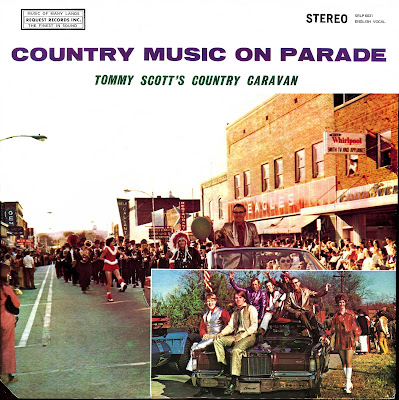Whenever I encounter a Goodwill LP called Country Music on Parade, and one of the titles reads Don't Kill a Man Because He Calls You a S.O.B., my first thought is going to be, "Maybe I need this one."
And, last post, I noted that I'm not here to mock things, and maybe I spoke too soon, since the songs on this LP cry out for a humorous review. But I'll do my best to keep the humor friendly. I could fashion a lame argument along the lines that, say, finding humor in music is not the same thing as mocking it, but my argument would necessarily be circular. Tautological, even.
Back to Don't Kill a Man Because He Calls You a S.O.B., I'm glad to report that the lyrics live up to the title. I just arrived in Hell and let me tell you, There's lots of faces down here that I know. Bu there's one face down here I can't stand the sight of, And that's the man I killed a while ago. The name that he called me did not fit Mama, And that's why I left him dyin' in the dirt.
"The name that he called me did not fit Mama"? Interesting way of putting things. And the last line delivers the song's moral: I lived a life I thought was pretty decent, But one mistake, and this is where you go. Yes, the singer sounds like he was living a pretty decent life. But you'll get an insult that does not fit Mama, and the next thing you know...
My favorite from this playlist of odd ditties (say that twenty times) is the tender love balled, Rosita:
Top of El Paso, just over the border in old Mexico, I met Rosita and she made me love her. She changed her mind and told me to go. I took my gun and cut her down. Rosita, I'll always love you.
And what better way to demonstrate that love? Georgia's Tommy Soctt, aka Ramblin' Tommy Scott, aka "Doc" Tommy Scott, seems to have been a major country/folk celebrity. Though he never cracked the charts, far as I know, there are Scott bios all over cyberspace. And PBS did a 2001 special on him. And there were German reissues of his older country sides. Solo recording artist, TV star, songwriter, Charlie Monroe bandmember, David Letterman guest, and leader of traveling medicine shows, Scott appears to have been a made-for-order "character." An eccentric for hire. And "eccentric," I think, perfectly describes his work on this not-quite-characteristic-of-the-genre country LP, released in 1971 on the "Music of Many Lands" label, Request Records Inc. of New Rochelle NY. If I were in a sarcastic mode, I might ask how many lands were musically involved in these selections.
Now, to be sure, the tunes and performances have a professional, Nashville-studio-pro sound to them--it's the texts which are memorably off-kilter. We have, in addition to the above examples, these lines from Geneva:
You turned this man into a child of three, By letting me taste how sweet your love can be. The... what?? And these interesting lines, from Nobody But You:
Baby, you're the only one that I let wear my ring, You're the one with whom I would do anything. And I let no one else mess up my hair, But if it's you, I find that I don't care. "Oh, it's you. Good. I won't have to shoot you."
And, from Scott's He Went That-a-Way, sung by Little Miss Betty:
I tried to hold myself back, but I just couldn't quit. With passion burning in my soul like fire down in a pit. He led me on, loved me hard, Then he went that-a-way.
(Not sure how to punctuate that second line without creating a dangling participle.)
And there are priceless Spike Jones-esque sound effects on Help Me Pull the Wagon--namely, whip snaps and "Hyaaa"'s. Scotty Lee sings, You ? money as if you think I own the mint. Girl, I ain't broke but I'm getting badly bent. I can't speak for everyone, but I know I hate it when I get badly bent.
Pollution also sports sound effects, and they happen right away--and loudly. So, if you're listening through speakers, you want might to cut the volume at that point--the noise is jarring. So are some of the lyrics:
Temperatures a-fallin' a little year by year. By twenty hundred, won't be none of us here. Preach the word: Tell the world about pollution, Save the world: Stop the awful execution.
Except for the temperatures-falling part and the "twenty hundred," Tommy was spot on. And I just discovered that, come tomorrow (Sep. 30th), it will be eight years since Tommy left us. I didn't plan things that way--that's just how the post worked out.
The LP's liner notes are by Hee Haw's "String Bean."
DOWNLOAD: Country Music on Parade--Tommy Scott's Country Caravan (1971)
TITLE/SINGER
Even I Can See the Sunshine--Chuck Housley
Unconcerned--Little Miss Betty
Don't Kill a Man Because He Calls You a S.O.B.--Chuck Housley
Geneva--Chuck Housley
What About That?--Sam Baxter
Nobody but You--Chuck Housley
Sally Ann of Greenville--Tommy Scott
Pollution--Tommy Scott
I Am Free--Sam Baxter
My Jimmy--Little Miss Betty
Pack Up, Ship Out and Go Home--Chuck Housley
He Went That-a-Way--Little Miss Betty
Help Me Pull the Wagon--Scotty Lee
Four Seasons of My Life--Tommy Scott
Rosebud--Tommy Scott
Rosita--Raymond Walker
Country Music on Parade--Tommy Scott's Country Caravan (Request Records Inc. SRLP 6031; 1971)
Lee














